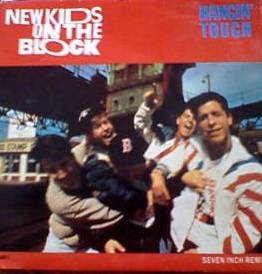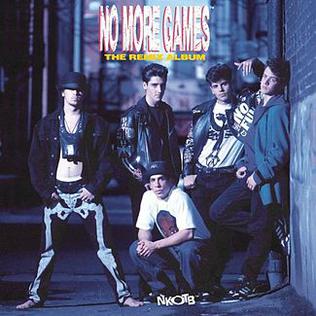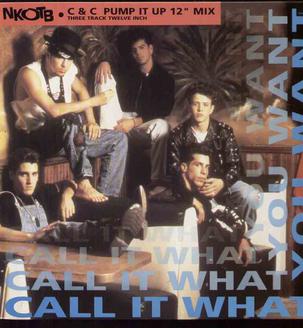
New Kids on the Block is an American boy band from Dorchester, Massachusetts. The band consists of brothers Jonathan and Jordan Knight, Joey McIntyre, Donnie Wahlberg, and Danny Wood. New Kids on the Block had success in the late 1980s and early 1990s and have sold more than 80 million records worldwide, and are often credited for paving the way for future boy bands such as Take That, Backstreet Boys and NSYNC. They won two American Music Awards in 1990 for Favorite Pop/Rock Band, Duo, or Group and Favorite Pop/Rock Album. In 1991, they performed the halftime show at Super Bowl XXV, a first for a pop music group.

Donald Edmond Wahlberg Jr. is an American singer-songwriter, actor and producer. He is a founding member of the boy band New Kids on the Block. Outside music, he has had roles in the Saw films, Zookeeper (2011), Dreamcatcher (2003), The Sixth Sense (1999), Righteous Kill (2008), and Ransom (1996), as well as the role of Carwood Lipton in the World War II miniseries Band of Brothers.
Noriko Kamachi, known professionally as Seiko Matsuda, is a Japanese singer-songwriter, known for being one of the most popular Japanese idols of the 1980s. Since then, she has continued to release new singles and albums, go on annual summer concert tours, perform at winter dinner shows, in high-profile TV commercials and movies, and make frequent appearances on TV and radio. Her alma mater is Chuo University.

Hangin' Tough is the second studio album by American boy band New Kids on the Block, released on August 12, 1988, by Columbia Records. It is widely regarded as the group's breakthrough album, gaining positive reviews for their musical transition from bubblegum pop to urban contemporary, blended with popular rock music. The group's label had planned to end their contract when their 1986 debut garnered little commercial and critical attention, which nearly led to their breakup. However, Maurice Starr, the group's producer, diligently persuaded the label to let them record a second album.

"You Got It (The Right Stuff)" is a 1988 single from New Kids on the Block. The lead vocals were sung by Jordan Knight and Donnie Wahlberg. The second single from the group's second album Hangin' Tough, it peaked at number 3 on the Billboard Hot 100 Singles Chart in early 1989, while topping the UK charts in November 1989. On the album, it was simply listed as "The Right Stuff"; the change to the single was probably to avoid confusion with Vanessa Williams' debut hit "The Right Stuff", which charted earlier that year. A Spanish version of the song was made ("Autentica") and peaked at number 11 in Spain.

"Hangin' Tough" is a song by American boy band New Kids on the Block, released as a single in 1989 through Columbia Records. It was the fourth single from the group's second album of the same name (1988). The lead vocals are sung by Donnie Wahlberg.

"Cover Girl" is a 1989 single from New Kids on the Block. The lead vocals were sung by Donnie Wahlberg. The fifth and final single from their multi-platinum second studio album Hangin' Tough (1988), it peaked at number two on the Billboard Hot 100 on the week of November 4, being held off from the top spot by Roxette's "Listen to Your Heart". The song became the fifth consecutive top 10 single from the album on the Billboard Hot 100, making NKOTB the first teen act to gain such chart success.

"This One's for the Children" is a 1989 single by New Kids on the Block. The lead vocals were sung by Jordan Knight and Donnie Wahlberg. Taken from the group's holiday album, Merry, Merry Christmas, the single peaked at number 7 on the Billboard Hot 100 in January 1990, and number 9 on the UK Singles Chart 11 months later.

The American boy band New Kids on the Block has released eight studio albums, seven compilation albums, one EP, thirty-two singles, and five video albums. As of 2005, they had sold more than 17.5 million albums in the United States alone and to date, over 80 million records worldwide.

New Kids on the Block is the debut studio album from American pop boy band New Kids on the Block released on April 1, 1986, by Columbia Records. The album failed to garner any attention at the time of its release. In August 1989, during the success of their second album, Hangin' Tough, Columbia released the New Kids on the Block track "Didn't I " as a single, in an attempt to bring this album to the attention of the group's growing fan-base. As a result, album sales spiked, causing it to be released outside the United States around the same time. Subsequently, the New Kids on the Block album would eventually be certified 3× Platinum by the RIAA, peaking at number 25 on the US Billboard 200.

"Step by Step" is a song by American boyband New Kids on the Block, released on May 10, 1990 as the first single from the album of the same name (1990). It is the group's biggest-selling hit single. The lead vocals were sung by Jordan Knight. Danny Wood sang "Step 1", Donnie Wahlberg sang "Step 2", Jordan Knight sang "Step 3", Joey McIntyre sang "Step 4", and Jonathan Knight sang "Step 5".

No More Games: The Remix Album is a remix album from pop group New Kids on the Block. It peaked at number 19 on the US Billboard 200.

American R&B singer Monica has released 8 studio albums, one extended play, and 48 singles. Since the beginning of her career in 1995, she has sold 5.3 million albums in the United States, In 1999, Billboard included her among the top twenty of the Top Pop Artists of the 1990s, and in 2010, the magazine ranked her 24th on its list of the Top 50 R&B and Hip Hop Artists of the past 25 years. With a career lasting over 20 years, Monica became the first artist to top the US Billboard Hot R&B/Hip-Hop Songs chart in the 1990s, 2000s, and 2010s.

"Summertime" is song by New Kids on the Block, and the first single from their album The Block. The single was released on May 13, 2008, and was the first new single released by the group since 1994.

"Single" is the second single from New Kids on the Block's fifth studio album, The Block, which is a duet with Ne-Yo. The lead vocals were sung by Joey McIntyre, Donnie Wahlberg, and Jordan Knight. Donnie also rapped in the song.

"Call It What You Want" is a 1991 song by New Kids on the Block. Written and produced by Maurice Starr, the original version appears on the group's third album Step By Step. A club/house remix produced by Robert Clivillés & David Cole, which also featured a rap intro by Freedom Williams, later appeared on the group's 1990 hits compilation, No More Games/The Remix Album and would ultimately serve as the second single to be released from that album. The lead vocals were sung by Jordan Knight, Joey McIntyre, and Donnie Wahlberg.

"Remix (I Like The)" is a song by American pop group New Kids on the Block from their sixth studio album, 10. The song was released as the album's lead single on January 28, 2013. "Remix (I Like The)" was written by Lars Halvor Jensen, Johannes Jørgensen, and Lemar, and it was produced by Deekay. The song features Donnie Wahlberg and Joey McIntyre on lead vocals.

"The Right Combination" is a song by Japanese pop star Seiko and American pop singer Donnie Wahlberg. The song was released in June 1990 and peaked at number 22 in Japan, number 54 in the US, and number 44 in the UK. It also peaked at number 11 in Australia, where it was certified gold.
Japanese singer-songwriter Seiko Matsuda has released fifty-five studio albums, forty-one compilation albums, six soundtracks, two remix albums, one extended plays, and eight box sets.
Japanese singer-songwriter Seiko Matsuda has released eighty-two official singles and eight promotional singles.
















